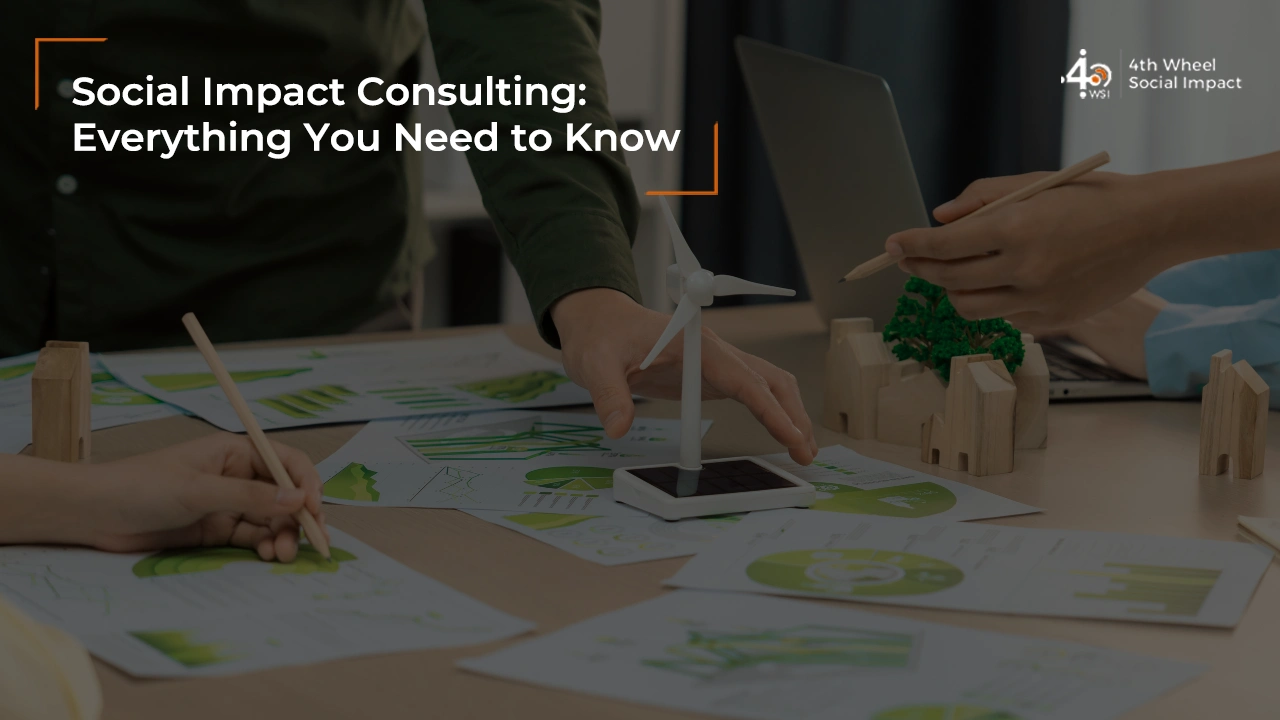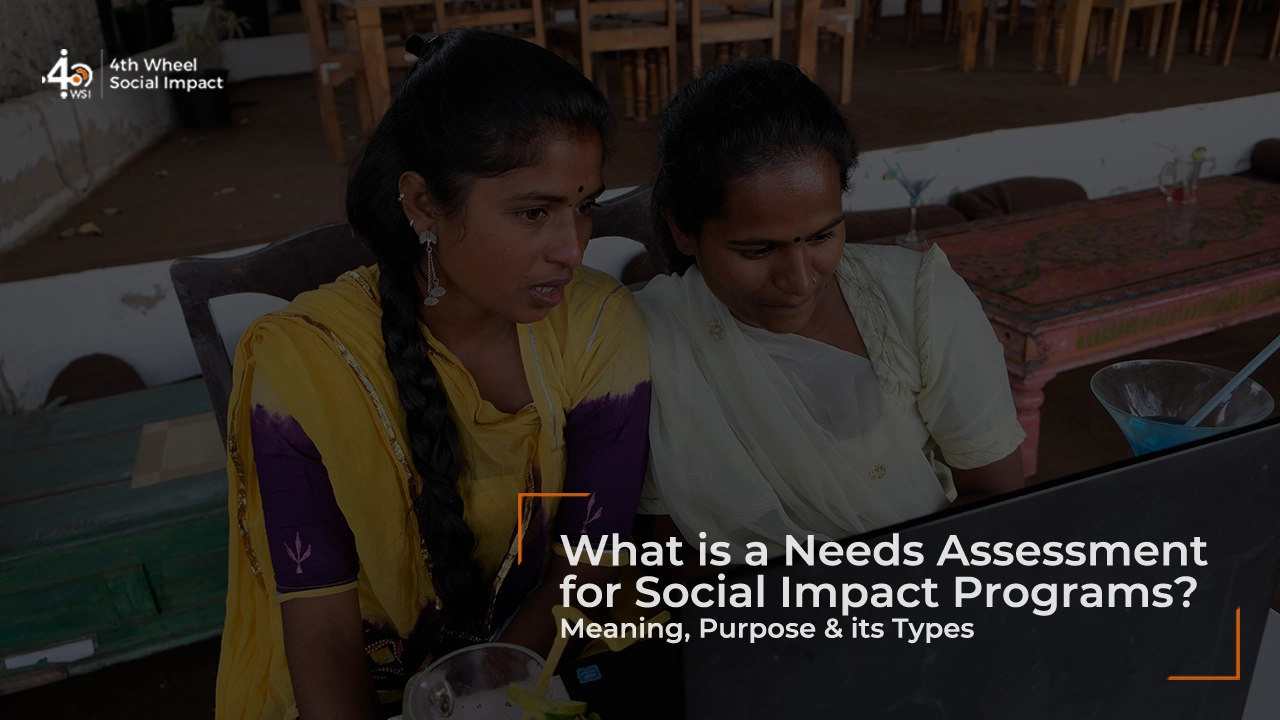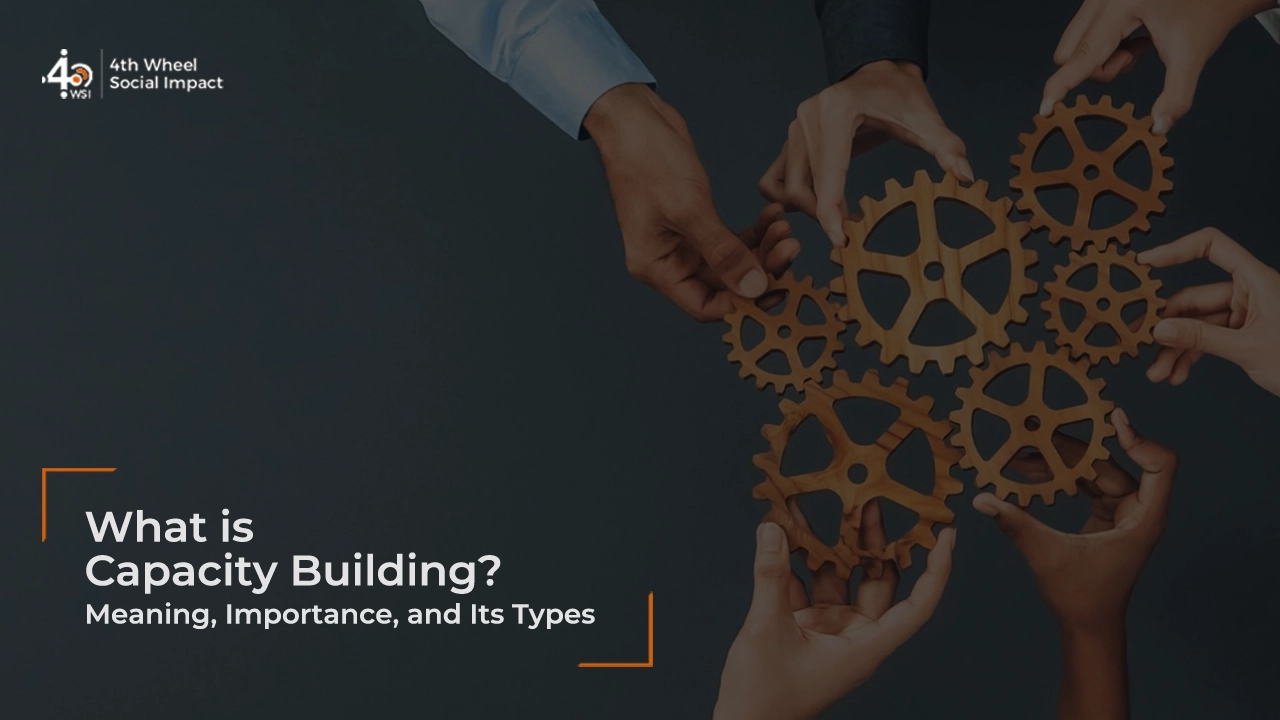The consulting industry has changed. Organizations now recognize that profit and purpose can work together. Social impact consulting has become a transformative methodology. It combines strategic expertise with a commitment to positive change. This guide explores everything you need to know about this field.
Table of Contents
What is Social Impact Consulting?
Social impact consulting assists organizations in generating quantifiable positive societal outcomes. It also helps them achieve their strategic objectives. Traditional consulting focuses primarily on financial returns and operational efficiency. Social impact consulting firms like 4th Wheel Social Impact integrate social, environmental, and ethical considerations into strategic planning.
This approach addresses complex societal challenges through systematic methods. These methods leverage business expertise, data analytics, and stakeholder engagement. Every social impact consultant works with nonprofits, social enterprises, government agencies, and corporations. They develop program design and strategies that generate both financial value and social good.
This field encompasses various specializations. These include sustainable development, corporate social responsibility, impact measurement and evaluation, social entrepreneurship, and public policy analysis. A professional social impact consultant often has an interdisciplinary background. They combine business strategy, public policy, development economics, and social sciences.
These experts act as connectors between commercial and social spheres. They translate complex social challenges into actionable business strategies. Their work creates sustainable solutions that benefit multiple stakeholders.
Social Impact Consulting vs Traditional Consulting

The primary difference lies in objectives and success metrics. Traditional consulting focuses on maximizing shareholder value. It emphasizes improved efficiency, cost reduction, revenue growth, and competitive advantage. Success is measured through financial indicators like ROI, profit margins, and market share.
Impact consulting adopts a triple bottom-line approach. It considers people, planet, and profit simultaneously. Financial sustainability remains important. However, success is also measured through social outcomes, environmental impact, and stakeholder value creation. Impact assessment demands that an impact consultant juggle multiple conflicting objectives.
The methodologies differ significantly. Conventional consulting depends on proven methodologies and established protocols. These have proven successful in similar business contexts. Impact consulting requires more innovative and adaptive approaches for monitoring and evaluation of the problems and its impact. Societal problems tend to be intricate, interwoven, and situation-dependent.
Stakeholder engagement represents another key distinction. Traditional consulting involves primary stakeholders like executives, shareholders, and customers. Impact strategy consulting requires extensive engagement with diverse groups. These include beneficiaries, community leaders, government officials, NGOs, and advocacy groups.
The timeline and impact measurement also vary. Traditional consulting projects focus on short to medium-term results with clear financial metrics. Impact consultancy services involve longer-term commitments. They use complex impact measurement and evaluation frameworks that track both quantitative and qualitative outcomes over extended periods.
Comparison Table: Social Impact Consulting vs Traditional Consulting
| Aspect | Traditional Consulting | Social Impact Consulting |
| Objectives | Maximize shareholder value | Triple bottom-line (People, Planet, Profit) |
| Success Metrics | ROI, profit margins, market share | Social, environmental, and financial outcomes |
| Methodologies | Proven protocols and established approaches | Innovative, adaptive, context-specific solutions |
| Stakeholders | Executives, shareholders, customers | Beneficiaries, NGOs, government, communities |
| Timeline | Short to medium-term | Long-term commitments |
| Problem Type | Well-defined business challenges | Complex, interwoven societal issues |
Interesting read: How to Create a CSR Strategy for Your Business in 2025
Benefits of Social Impact Consulting
- Enhanced Reputation and Brand Value
Organizations gain numerous benefits that extend beyond traditional business advantages. Enhanced reputation and brand value represent significant benefits. Consumers, investors, and employees prefer organizations that demonstrate genuine commitment to social responsibility. This improved reputation translates into increased customer loyalty, better talent attraction and retention, and improved investor confidence.
- Risk Mitigation
Risk mitigation constitutes another crucial benefit. Impact strategy consulting assists organizations in recognizing and mitigating potential social, environmental, and regulatory threats. This happens before they become costly problems. This proactive approach prevents reputational damage, regulatory penalties, and operational disruptions.
- Market Access and New Opportunities
Access to new markets and opportunities emerges through social impact initiatives. Organizations often discover untapped market segments and innovative partnership opportunities. They find new revenue streams while addressing social challenges. This leads to sustainable competitive advantages and long-term growth opportunities.
- Employee Engagement and Culture
Employee engagement and organizational culture improvements are consistent. Organizations pursuing impact consultancy services see higher job satisfaction among employees. Workers report increased motivation and stronger organizational commitment. They feel their work contributes to meaningful social change.
- Financial Benefits and Cost Savings
From a financial perspective, social impact consulting can lead to cost savings. This happens through improved operational efficiency, reduced waste, and optimized resource utilization. Many organizations discover that sustainable practices result in significant cost reductions over time.
- Innovation and Creativity
Innovation and creativity flourish in organizations engaged in social impact work. The complex nature of social challenges requires innovative thinking and creative problem-solving. This improves organizational capacity for innovation across all areas of operation.
Also read: Social Impact Management: Integrating Impact Measurement into the Program Lifecycle
The Role of Data in Social Impact Consulting
- Foundation of Evidence-Based Decision Making
Data serves as the foundation for evidence-based decision-making, impact measurement and evaluation. Social impact data is often complex, multidimensional, and challenging to quantify. This requires sophisticated analytical approaches and innovative measurement frameworks.
- Core Applications: Monitoring and Evaluation
Impact measurement and evaluation represent core applications of data. Every impact consultant develops detailed monitoring and evaluation systems. These track both short-term outputs and long-term outcomes. This involves creating logic models that map causal relationships between activities, outputs, outcomes, and impacts. Organizations gain the ability to comprehend and showcase their social value generation.
- Data Collection Methodologies
Data collection methodologies are diverse and context-specific. Quantitative data includes beneficiary numbers, cost per impact, geographic coverage, and demographic information. Qualitative data encompasses stakeholder feedback, case studies, narrative reports, and ethnographic observations. Mixed-methods approaches provide a complete understanding of social impact.
- Digital Platforms and Advanced Tools
Digital platforms and advanced tools strengthen data gathering and analytical processes. Mobile data collection platforms, satellite imagery, social media analytics, and machine learning algorithms enable more efficient and accurate data gathering. These technological advances allow for real-time monitoring and adaptive program management.
- Data Visualization and Communication
Visual representation of data and narrative communication collaterals are vital for conveying impact to varied stakeholder groups. Professionals in impact consulting must translate complex data into compelling narratives. These narratives connect with different audiences, from technical program managers to board members to community stakeholders.
- Predictive Analytics and Modeling
Predictive analytics and modeling are emerging as powerful tools. Through examination of past data and recognition of trends, an impact consultant can forecast potential results. They can improve resource allocation and identify the most effective intervention strategies.
Use Cases of Social Impact Consulting

Impact consultancy services applications span numerous sectors and challenge areas. This showcases the adaptability and applicability of social impact methods in various sectors.
For instance, 4th Wheel Social Impact has been a social impact consulting firm since 2010. In this period, we have undertaken many social impact consulting projects for strategy development, monitoring and evaluation of programs, impact assessment, etc.
One notable case involves strategic consulting for Nebula Infraspace’s social initiatives and CSR activities in health, education, and infrastructure. Their “Aavaas” affordable housing venture, launched in 2016, exemplifies how impact strategy consulting supports scalable solutions. The project spans multiple Indian cities including Changodar (Ahmedabad), Miyapur (Hyderabad), and Chennai, delivering over 10,000 affordable apartments priced between 7-30 lakhs.
Another example of social impact consulting includes the preparation of a strategic action plan for strengthening tourism enterprises in North East India. The consultancy focused on building a strategic action plan to enhance tourism competitiveness and upgrade value chains of popular tourism market segments of North East States (NES), through women and community-led enterprises.
Such projects illustrate how impact consulting addresses complex regional challenges while creating economic opportunities for marginalized communities.
Other examples of impact consultancy services use cases include:
Corporate Strategy Development
An impact consultant helps companies integrate social impact into core business operations. They build responsible supply networks and establish mutual benefit programs that serve both business and society.
Nonprofit Capacity Building:
Professionals in social impact consulting work with nonprofit organizations to develop strategic plans, improve operational efficiency, and design evaluation frameworks. For example, this includes helping education nonprofits refine program delivery or assisting healthcare organizations to scale their services.
Government and Public Sector Work:
An impact consultant collaborates with agencies to improve public service delivery through evidence-based policies and citizen engagement strategies. Examples include performance management systems for social programs and policy analysis for education reform.
Social Entrepreneurship Support:
Impact strategy consulting helps entrepreneurs develop financially sustainable business models that address social challenges. This could include conducting market analysis for purpose-driven businesses and preparing impact-focused startups for investment.
Impact Investment Analysis
Specialized professionals in impact consulting help investors evaluate the social and environmental impact potential of opportunities through stakeholder analysis and scalability assessments of social impact business models.
Global Development Programs
Crisis response consulting requires collaboration with aid organizations, public agencies, and international bodies that address global development problems. This could encompass creating tracking frameworks for aid programs, conducting post-conflict needs assessments, and developing climate adaptation strategies.
Also read: Rapid community needs assessment: Tata Power Community Development Trust
Conclusion
Social impact consulting represents a transformative approach to addressing the world’s most pressing challenges while creating sustainable value for organizations. As societal expectations evolve and stakeholders demand greater accountability, the relevance of impact consultancy services continues to grow. Organisations must recognize that this isn’t simply a trend; it represents a fundamental shift toward more sustainable and responsible business practices.
The future of impact strategy consulting demands tech-based impact measurement and evaluation techniques and inclusive frameworks to address problems for marginalized communities. Hence, social impact consulting needs to be more effective and efficient than ever before.
At 4th Wheel Social Impact, our team of skilled impact consultants combines analytical rigor with deep sector expertise to help you create lasting positive impact while achieving your business objectives.
Ready to transform your organization’s approach to social impact? Contact us today to explore how our social impact consulting services can help you build sustainable and successful monitoring and evaluation practices.




